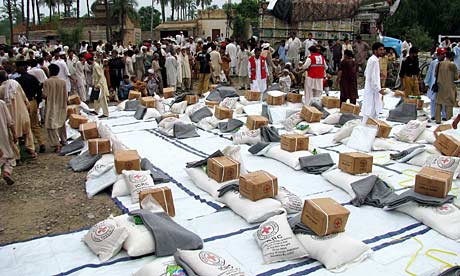
Gordon Brown has appealed to the British public to donate more amid concern that the official international response to the flood disaster in Pakistan has been slow and ungenerous compared with past emergencies.
The former prime minister, in one of his first interviews since his election loss, insisted that "compassion fatigue" was not a factor.
"I think there's not a compassion or giving fatigue," Brown told GMTV. "I think there's an outpouring of compassion in this country. I think we are seeing the number of people wanting to do something rising."
Brown, who said he was adapting to life after being prime minister and enjoying spending more time with his family, added: "When you see on television a young infant girl struggling for life, probably not being able to make it as a result of the floods, you want to do something. I think every single person in this country will have that compassion."
Aid officials in the UK agreed with Brown that Britons had given generously. "We are very grateful for donations from the public," said Brendan Paddy, a spokesman for the Disasters Emergency Committee (DEC), which has raised £9.5m for the floods relief effort. "We are pleased with the response."
Paddy said it was important to distinguish between the official international response, which has been criticised as sluggish, and the donations from the general public, "where the money coming through is not a problem".
The DEC said, however, that people needed to keep giving because the flood waters re still spreading fast and continuing to affect millions of people.
Brown said he hoped the government would match any donations made by the British people.
The DEC said more money was needed to help the 14 million people affected by the worst flooding in Pakistan's 63-year history. Aid has been distributed to 545,000 people by the DEC's member agencies, but the UN yesterday warned that its emergency workers were in danger of being overwhelmed by the scale of the crisis.
The UN says the disaster is the biggest Pakistan has faced and it would cost billions to rehabilitate the victims and rebuild ruined infrastructure.
Oxfam, the aid agency, said the UN's financial tracking system showed that as of 9 August, governments had committed less than $45m (£28.5m), with an additional $91m pledged – considerably less than was collected for previous disaster relief efforts over a similar period. India, Pakistan's much larger and wealthier neighbour, has not offered any aid or assistance.
The boxer Amir Khan yesterday appealed for people to contribute to the relief effort. The 23-year-old, whose family comes from Pakistan, said: "Day by day it's getting worse, the monsoon weather, and it's just a shame to see that. Pakistan is a poor country, and you just feel for them because they need help."
The world light welterweight champion, from Bolton, added: "We have to remember that these people have lost their homes, their livestock – they've lost everything. The main things they need are food, water, clothing and shelter."
Even as relief agencies appeal for more money, Pakistani Taliban militants have urged the government to reject western aid for victims of the devastating floods, saying it would only be siphoned off by corrupt officials.
"We urge the government not to take western aid," a Pakistani Taliban spokesman, Azam Tariq, told Reuters.
"The government in Khyber-Pakhtunkhwa and the centre are desperate to get it, not for the people affected but to make their bank accounts bigger," he said, referring to the north-western province hardest hit by the floods.
Some aid workers have expressed concern that Ramadan, the month of fasting for Muslims, which is due to begin tomorrow in Pakistan, could complicate the situation. People getting poor nutrition are not well placed to fast, although abstaining from drinking water for much of the day could protect people from water-borne diseases.
"Definitely, they are not in a good position to fast. The food they are taking is not enough," Dr Ahmad Shadoul told Reuters.
"On the other hand, fasting can be a preventive measure for diarrhoea as people are not drinking water for 14 to 15 hours."
The US announced an additional $20m in aid yesterday amid growing concern over the political, economic and security ramifications of the disaster. The new aid brought to $55m the amount of funds committed by the Obama administration, which needs a stable Pakistan to help it end a nine-year war by the Taliban in Afghanistan.
President Asif Ali Zardari, who was heavily criticised for continuing with a European tour despite the disaster, was in the southern city of Karachi today, but it was unclear whether he would visit the disaster zone.
• To make a donation to the DEC Pakistan appeal, call the 24-hour hotline on 0370 60 60 900, visit dec.org.uk, donate over the counter at any post office or high street bank, or send a cheque. People can also donate £5 by texting the word GIVE to 70707.







